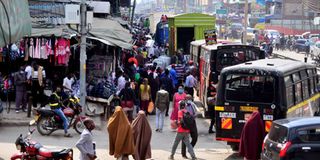How to reopen economies: Study

Business at Eastleigh has gone back to normal after the lockdown. PHOTO | SALATON NJAU | NATION MEDIA GROUP
All over the world, reopening economies amid the Covid-19 pandemic has proven to be a delicate act.
To find a balance, a team of researchers from the Massachusetts Institute of Technology has released a report that examines the best and worst tradeoffs in economic benefits versus health risks.
This report indicates that Kenya was right to allow banks to continue opening. It ranked banks as the most economically significant and safe to operate due to their structure. “Banks tend to have bigger spaces that few people visit only once in a while,” said Seth Benzell, who co-authored the study. This helps with social distancing.
However, other businesses that have continued to open were found to be of less economic impact and with elevated health risks. “Businesses such as liquor and tobacco stores and gyms ranked at the bottom due to their overcrowding nature,” said Benzell in the findings published in the journal Proceedings of the National Academy of Science.
This report was echoed by a related study conducted by scientists from the University of Oxford and the United Kingdom Centre for Ecology and Hydrology. It found out the best way to end quarantine without impacting on the economy and the population’s health is to use a gradual strategy that involves subgroups.
“Ending quarantine for the entire quarantined population simultaneously is a high-risk strategy. Instead, governments should focus on a gradual reintegration approach,” said the study published in the journal Frontiers in Public Health.
In the UK, the researchers recommended that the best strategy to lift lockdown would be to release approximately half of the population to work two-to-four weeks from the end of an initial infection peak, and then wait for another three-to-four months to pave way for a potential second peak to pass before releasing everyone else.
Kenya, however, is yet to reach its infection peak, or roll out proper mass testing.
“The most appropriate solution depends partly on the coronavirus recovery rate, the rate of viral transmission, but hardly the death rate, the incubation period, or the effectiveness of lockdown measures,” said Michael Bonsall, a professor at the University of Oxford, who led the study.



